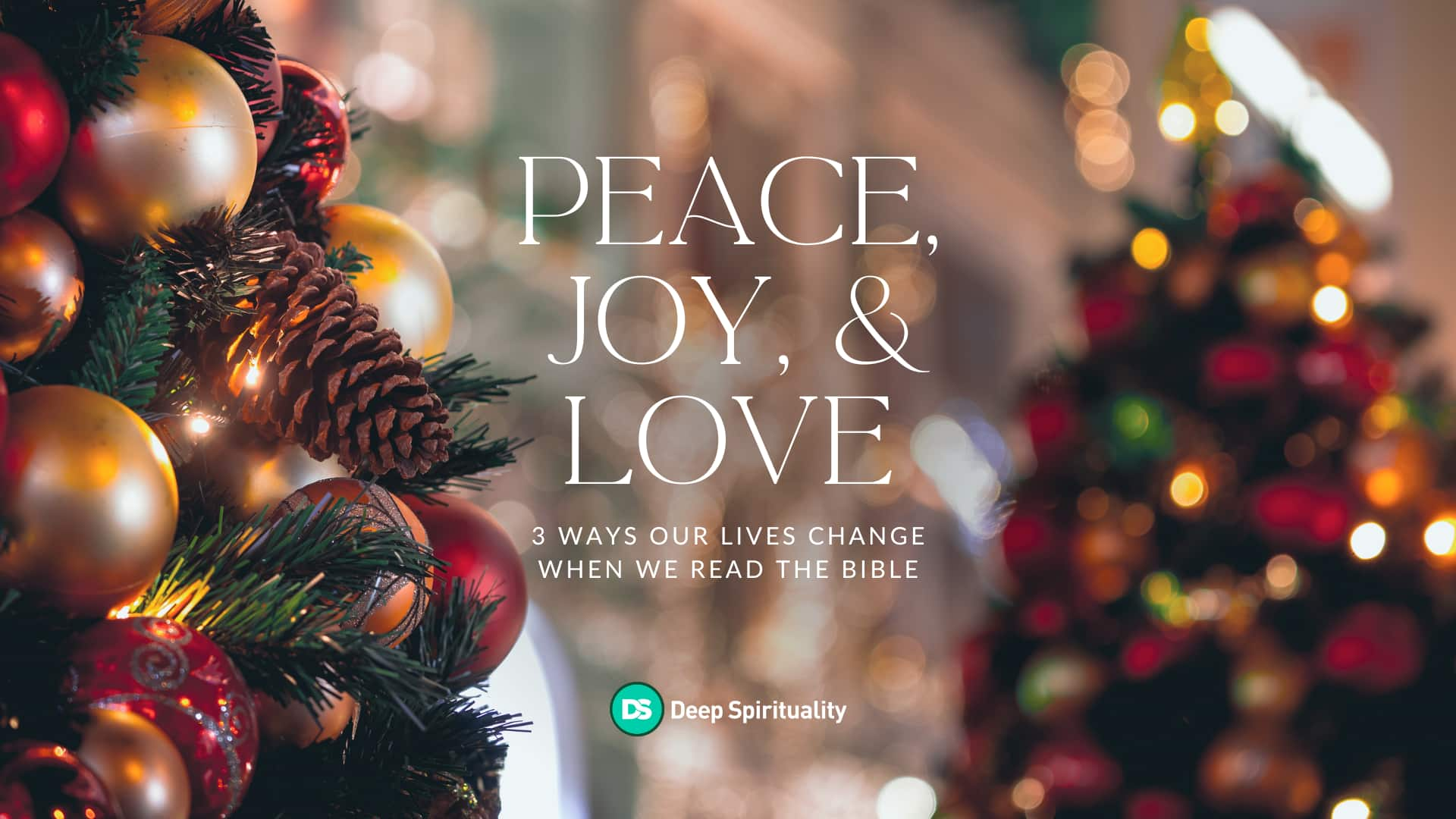I still remember the butterflies in my stomach on the day I proposed.
My girlfriend and I hiked up one of my favorite trails in Oakland to a beautiful panoramic view of the Bay Area. As we got to a bench overlooking the ocean, I got down on one knee and asked her to marry me, and luckily she said yes. I was filled with incredible gratitude and excitement as we celebrated with our friends and family that evening.
Then, over the next few days, I remember starting to think, “She said yes! Now what?”
The stress of planning the wedding, the to-dos leading up to it, and the demands of hosting my family coming from another country for the special day all started rushing through my mind.
Fortunately, we had some generous spiritual friends who helped us with how we should be thinking and prioritizing our time leading up to our wedding.
They helped us see that one of the most important things we could do as we were preparing for marriage was learning to overcome selfishness.
“This is My commandment, that you love and unselfishly seek the best for one another, just as I have loved you.
John 15:12 AMP
In this passage, Jesus speaks to his disciples and describes the key secret ingredients that will make their relationships go well: love and the selflessness to seek the best for one another. This is true and applicable when it comes to learning to build a strong marriage too.
Engagement is a crucial time to learn how to build the foundation of our marriage. Our friends would consistently remind us that it takes twelve years to graduate from high school and four years to get a Bachelor’s degree, yet it can take as little as 15 minutes to become husband and wife.
If we want to love one another unselfishly, ‘as long as we both shall live,’ we need to put time and effort into learning how to do that.
If we want to love one another unselfishly, ‘as long as we both shall live,’ we need to put time and effort into learning how to do that
One of the biggest mistakes we can make while we’re engaged is getting bogged down by the anxieties of planning the wedding ceremony instead of learning how to be husband and wife.
Wedding ceremonies are lovely and memorable experiences, but they’re over in a few hours. During your engagement, the work you do to learn to love each other unselfishly will help you have a strong, healthy, and happy marriage for years to come.
In this devotional, we will discuss five tips to make your engagement successful and to help you prepare for marriage. We hope that these tips will help you become who God wants you to be for your spouse and also develop a vision for the kind of significant impact God can make through you and your future spouse as you go through life together:
[…] Each one of us is joined with one another, and we become together what we could not be alone. Romans 12:5 Voice
Facing facts: marriage isn’t about me
Without weakening in his faith, he faced the fact that his body was as good as dead—since he was about a hundred years old—and that Sarah’s womb was also dead. Yet he did not waver through unbelief regarding the promise of God, but was strengthened in his faith and gave glory to God, being fully persuaded that God had power to do what he had promised.
Roman 4:19-21 NIV
Engagement is an exciting phase in life. We get to learn more about ourselves and our fiancé while beginning to plan our life together.
One of the things I (Cristina) recognized through our engagement was the set of perspectives and expectations I had developed about marriage and how it would impact my life. I believed that marriage would bring me confidence, security, consistent happiness and would satisfy me.
Since my teenage years, my dream in life consisted of having a husband and a life that revolved around us. But when we started digging into the truth about what the Bible said about marriage, I realized that my way of thinking was way off base. Marriage wasn’t supposed to be about getting my needs met through a person; it was about learning to love and help the other person and working together to fulfill God’s purpose.
The scripture in Romans 4 talks about how Abraham had to face some challenging truths about himself and his wife. Abraham had to consider the fact that they both had physical weaknesses that could prevent them from having children.
Similarly, the process of engagement is one where we are called to face facts about both our strengths and weaknesses as individuals and as a couple. We shouldn’t go into marriage blind about the potential issues and pitfalls we will have to face later down the line. Instead, we should choose to be honest.
What we are telling you now is the very message we heard from Him: God is pure light, undimmed by darkness of any kind. 6 If we say we have an intimate connection with the Father but we continue stumbling around in darkness, then we are lying because we do not live according to truth. 7 If we walk step by step in the light, where the Father is, then we are ultimately connected to each other through the sacrifice of Jesus His Son. His blood purifies us from all our sins.
1 John 1:5-7 VOICE
It requires truth to build close and intimate connection with God and our spouse to be.
Before getting married, we had to face the truth about our relationships with God, our past and current flaws and weaknesses, and our unhealthy and unspiritual expectations for each other. We had to face that we were two selfish people getting married and change our expectations on what our goal in marriage would be.
It felt uncomfortable to face all these truths, but it pushed us to rely on God more and helped us develop a deeper connection with each other.
Reflection questions
- What facts do we need to face about our relationship with God?
- What truths about ourselves do we need to be honest about with God and our fiance?
- What facts are we tempted to ignore about our fiancé?
- What truths do we need to face about our future spouse?
Learning to serve instead of being self-absorbed
Even after being married for six years, learning to serve my spouse is a battle I have to fight daily.
My natural inclination is to be obsessed with myself, my emotions, my wants, and my dreams, leaving no room in my heart for my spouse.
Being engaged is a great time to learn and grow in our ability to serve, which according to Jesus, is the highest calling we can strive for (Matthew 20:25-28 TPT).
[…] Obsession with self in these matters is a dead end; attention to God leads us out into the open, into a spacious, free life. Focusing on the self is the opposite of focusing on God. Anyone completely absorbed in self ignores God, ends up thinking more about self than God. That person ignores who God is and what he is doing. And God isn’t pleased at being ignored. Romans 8:5-8 MSG
According to this passage, being obsessed with ourselves is the opposite of being focused on God. We cannot understand who God is and what he is doing if we continuously think about ourselves.
If we don’t fight to overcome our selfishness, we will miss out on the kind of spouse God wants to make us into, the dreams that he has for our marriage, and the impact he wants us to have.
We have to choose what kind of life we want to live: one that leads to a dead-end or one led by God into open, spacious and free life.
A dead end marriage is one where we feel trapped and hopeless. We can’t grow to the fullest of our potential and keep hitting the same issues and patterns without being able to break free. And we are not able to reach all of the people God has intended for us to influence.
[…] Don’t push your way to the front; don’t sweet-talk your way to the top. Put yourself aside, and help others get ahead. Don’t be obsessed with getting your own advantage. Forget yourselves long enough to lend a helping hand. Philippians 2:3-4 MSG
The Bible calls us here to lend a helping hand. In other words, to serve others. To do so, we have to choose not to be obsessed with what we want but choose to fight to put others ahead of ourselves.
One of the things that attracted me to my wife was her hunger to help others. She helps me get out of my comfort zone and challenges me to fight to make others around me better.
We have become more of a force for change and more effective at helping others together than alone.
Reflection questions
- Where do you see yourself being self-absorbed? What impact does it have on your relationships?
- How will changing this mindset prepare you for marriage?
- Who can you start serving today?
Be willing to be influenced instead of being self-reliant
Plans go wrong for lack of advice; many advisers bring success.
Proverbs 15:22 NLT
When it comes to planning our future, we can be driven by strong opinions and desires about how we want things to go.
This is especially true during the engagement process. We had many thoughts on how we wanted the wedding day to look, how the planning process should go, and what preparing to get married should be like.
We can think that we will only be happy or things will only be successful if things go our way or our to-do list gets done. I (Cristina) remember having my to-do list and feeling very stressed that we couldn’t find the “right” venue.
I remember researching for places online and visiting several venues. But it was taking a while to find the right place, so I started blaming and complaining to my fiance that it was his fault because he wasn’t helping enough.
Your wedding is an opportunity to celebrate your marriage and the beginning of your journey together. It’s also a way to inspire people about how God can impact our lives.
Luckily, he chose a different approach and decided to rely on prayer and asking a friend for help. We were able to book the venue a few days later. I thought doing things my way would lead to success, but it only led to frustration.
We need to look into the Bible to redefine success. According to Proverbs 15, ‘success’ in our engagement will come when we have people around us that can guide and advise us. We need God and friends to help guide and plan our marriage so that it will last a lifetime.
We’ve seen three main things that can stop us from wanting to be influenced in our plans or our way of thinking:
- Pride – we think our way is right or better
- Fear – we think we won’t be happy if we don’t get our way
- Denial – we think our situation is unique and no one would understand
During our engagement, we learned to regularly sit down with friends who were already married and so we could get advice about everything from how to think about our finances to how to change our character so we could learn to love each other.
Reflection questions
- Are we including anyone in the plans we are making for our wedding and our future?
- What can stop us from asking for advice?
- Who are 2-3 friends you can ask advice from about wedding planning and also how to plan for a successful marriage?
Make the most of our opportunities
So be very careful how you live. Do not live like those who are not wise, but live wisely. Use every chance you have for doing good, because these are evil times. So do not be foolish but learn what the Lord wants you to do.
Ephesians 5:15-17 NCV
For most women, when we are thinking through our wedding day, we have a particular wedding dress in mind, a color scheme, the perfect flowers, and a picturesque wedding venue.
Our first thought is not usually, “What will be the wedding that will inspire my family and friends to see God in a new light?”
One of the best ways to prepare for marriage spiritually is by changing how we think about the wedding’s purpose.
This passage in Ephesians 5 challenges us to be aware of how we’re living our life. We should ask ourselves questions to reflect: are we doing good for ourselves or doing good for others?
God wants us to live our lives by using every opportunity that comes our way to love and care for others and not be self-focused. Your wedding is an opportunity to celebrate your marriage and the beginning of your journey together. It’s also a way to inspire people about how God can impact our lives.
A generous person will prosper; whoever refreshes others will be refreshed.
Proverbs 11:25 NIV
As the scripture says, when we live with a generous attitude, we feel refreshed with renewed strength and energy.
As we were planning our wedding, we used various opportunities to include our family and friends in our everyday lives. It was vital for us to make sure that they felt part of our journey.
Focusing more on how we could love our family and friends helped us feel less stressed about the wedding plans and how everything would turn out.
I (Cristina) remember feeling very stressed the first few months of planning our wedding. As we included more people and shifted our focus from ourselves to others, I found myself feeling very relaxed and enjoying the month leading up to our wedding.
Reflection questions
- What’s the primary focus of your wedding (your wedding day or the impact you can have on others)?
- What are practical ways you can do good for others that you can incorporate into your wedding planning or wedding day?
- Is the stress you feel as you plan your wedding due to focusing on yourself and planning a perfect wedding?
Involve others instead of isolating
It can be easy during the engagement process to get consumed with our soon-to-be spouse, the wedding day and ignore all other relationships. This is not a good way to build.
With all its ups and downs, marriage cannot be strong without the help and influence of other spiritual friends.
An unfriendly person isolates himself and seems to care only about his own issues. For his contempt of sound judgment makes him a recluse.
Proverbs 18:1 TPT
This scripture warns us about being unfriendly and isolating ourselves. We do this when we are selfish and only care about issues that concern ourselves.
Being engaged is an incredible opportunity to build new relationships and strengthen existing ones.
My (Ade’s) engagement was a period in which I fought hard to build invaluable friendships with other men in my peer group who had recently navigated engagement themselves. It was also when I grew closer to more senior mentors who guided me and taught me how to build my marriage.
Involving others is also an excellent opportunity to find ways to help, develop, and love others. A couple of my childhood friends were my groomsmen, and they were inspired by how God had changed and built my life.
Reflection questions
- Where do we see ourselves isolating instead of involving others?
- Who can we involve in our lives?
- Who can we impact if we involve them?
Explore more:
Ade played in the LNB Pro B, France's men's professional basketball league. After moving to the U.S., he received a B.S. in accounting at San Francisco State University and currently is actively involved in youth and professional mentorship.
Ade played in the LNB Pro B, France's men's professional basketball league. After moving to the U.S., he received a B.S. in accounting at San Francisco State University and currently is actively involved in youth and professional mentorship.





